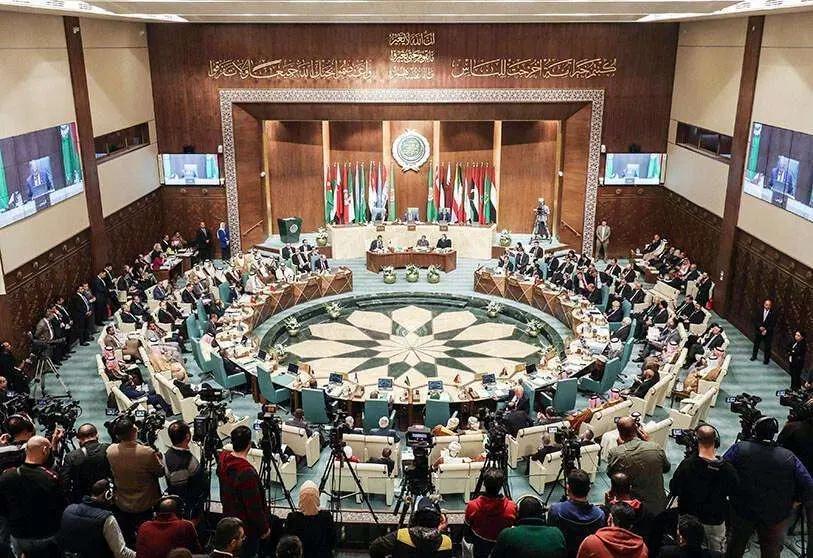The Arab world in the face of the Ukrainian crisis

While Western governments are unanimous in their condemnation of the Russian invasion, the Arab League is somewhat reticent. Moreover, the Arab world is outraged on social media at the unequal treatment of Ukraine compared to Iraq, Syria and Afghanistan.
On 2 March the UN General Assembly adopted by a majority of 141/193 a resolution demanding that Russia stop the war against Ukraine. With 5 votes against (Russia, Belarus, Syria, North Korea and Eritrea) and 35 abstentions including 3 Arab countries, Algeria, Iraq and Sudan.
Algeria, an ally of Russia, should have voted in favour of the UN resolution condemning Russia as it has always claimed to champion the cause of oppressed peoples. But it did not. It abstained. This is still explicit support for Putin. The Kingdom of Morocco, like Kuwait and Jordan, has reaffirmed its firm commitment to respect the territorial integrity, sovereignty and national unity of all UN member states.
The Gulf Cooperation Council (GCC) countries have remained cautious. These are countries that have managed to develop their economies and defensive autonomy on the basis of a multilateral policy in which Russia has been playing an important role in the Arabian Peninsula. And this is due to serious disagreements with the US, which since the Obama administration has been relaxing its defensive policies towards the Middle East, culminating with Trump in the Abraham agreements to provide security for Israel, after long years of American interventionist policy in the area with European support.
Geopolitics has become volatile. And Arab countries are finding it hard to position themselves. The Arab League has spoken out, urging the parties to find a political solution to the conflict. A strategic reticence that redefines relations with the US and inaugurates a neutral position between the US and Russia (also vis-à-vis China). This is a position that has several edges. One of these is the reaction of Arab citizens, who have been burning up social networks over the unequal treatment accorded to Ukraine compared to the invasion of Iraq, in which, in addition to the US, many European countries participated directly and many others supported it. A conflict that generated close to 2 million human lives and a wave of refugees. Just like the invasion of Afghanistan and the war in Syria.
The reprehensible invasion of Ukraine, which no one is managing to stop, is generating refugees who are being welcomed with flowers, buses with destinations on demand, comfortable enclosures, psychological assistance and cuddly toys for children. The very rulers of nations such as Poland and Hungary or Bulgaria (which refused to take in Syrians), Moldova and Romania visited the border points to welcome them. And European interior ministers, meeting in Brussels, are coordinating work and residence permits.
However, this sweet welcome has taken place amidst a suspicious attitude towards African students, enrolled in Ukrainian universities, which the African Union has described as "racist" when they are turned away at the border.
Moreover, social networks point out that the warm reception of Ukrainians contrasts with what happened to Iraqi, Afghan or Syrian refugees who had been stopped in their tracks by fences and barbed wire, confined to the open air under cruel weather conditions.
Internet users have been even more outraged by the racist comments circulating on social networks by journalists, talk show hosts, analysts and political leaders from all over Europe. In one video, a number of commentators on different French channels portray the war in Ukraine as "unbelievable that it is happening in Europe with cruise missiles as if we were in Iraq or Afghanistan". Another talk show host, referring to the Ukrainian refugees, exclaimed "it will undoubtedly be a high quality immigration, they are intellectuals". Another retorted, "they are Europeans of culture". Another retorted, "these are not Syrians fleeing the Syrian regime's bombings, but Europeans fleeing in cars like ours". Bulgarian Prime Minister Kiril Petkov stressed that "these are not the refugees we are used to, these people are Europeans".
Others remember the Hungarian journalist Petra Lazslo, who, in September 2015, started kicking and tripping Syrian refugees trying to enter Hungary. Images that remain in our minds where the journalist, camera in hand, was kicking, one of them at a little girl, and then tripping a father who ended up on the ground next to the child he was carrying in his arms. Or the image of the Syrian baby, Aylan, lying on a Turkish beach after the boat in which he was travelling with his parents capsized.
Strange as it may seem to have a war in the heart of Europe, it is worth noting that the old continent has always been a place of war. Savage wars that have been exported to Africa, the Americas, Asia and Oceania in bloody invasions against innocent and unarmed or less militarily developed peoples for the sole purpose of subjugating them and stealing their wealth. Many of them have been annihilated (Indians in North America or Tasmanians in Australia). But without going any further, we can cite the Hundred Years War, 1337-1453, the Balkan War, 1912-1913, the First World War, 1914-1918, the Second World War, 1939-1945, the Yugoslav wars, 1991-2001, etc.
Refugee aid, which the United Nations advocates through the UNHCR, must be carried out regardless of nationality, skin colour, faith or ideology.
The European model cannot be built on discrimination and racism.

